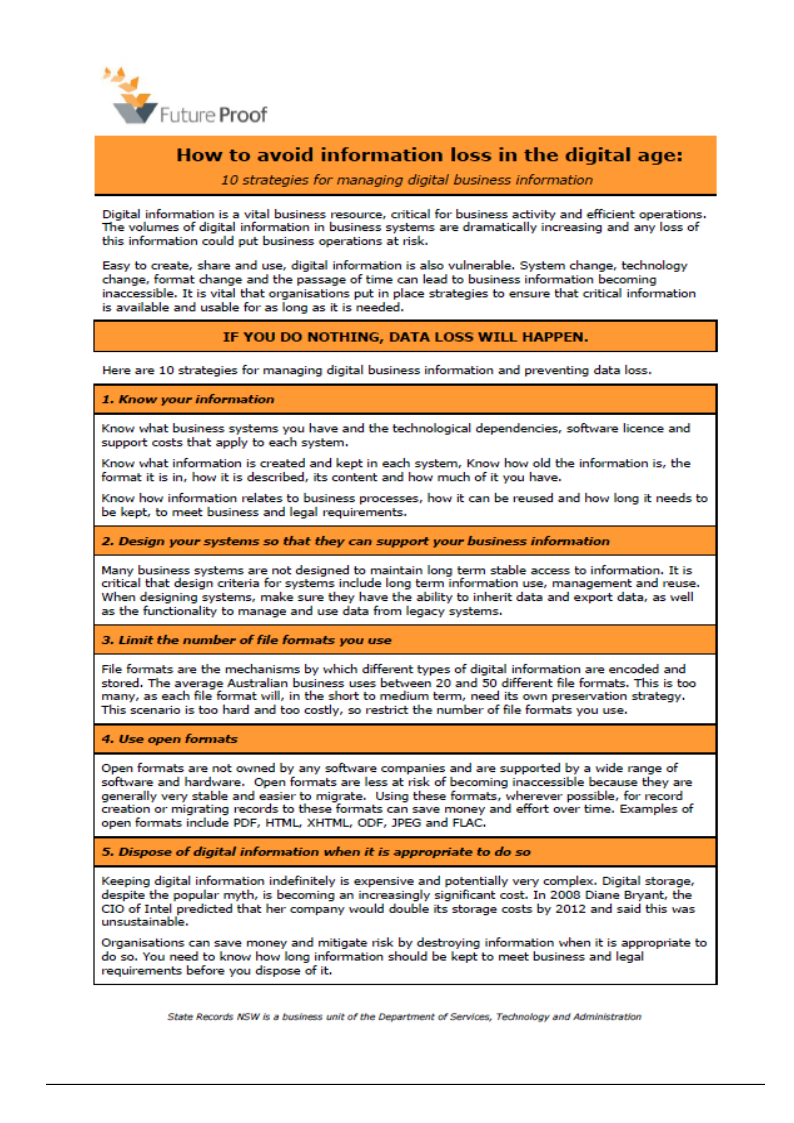How to avoid information loss in the digital age May 17, 2010 5 Comments
Digital information is easy to create, share and use and is today a vital business resource, critical for business activity and efficient operations.  Digital information however is very easy to lose and this can become a very costly problem for your organisation to manage and to deal with into the future. Read the rest of this entry »
Digital information however is very easy to lose and this can become a very costly problem for your organisation to manage and to deal with into the future. Read the rest of this entry »
Traces of Nathan April 16, 2010 No Comments
 As anyone who works in recordkeeping knows, government records are inextricably bound up with the ebb and flow of administrative and political change. This is no less true in the digital environment, a recent case in point being the departure of the former Premier, Nathan Rees, who was removed by the Labor caucus and replaced by Kristina Keneally on December 3 last year. As the State’s recordkeeping regulator and archive, it was then necessary for State Records to investigate how the official records of Rees’s Premiership would be protected and preserved. Read the rest of this entry »
As anyone who works in recordkeeping knows, government records are inextricably bound up with the ebb and flow of administrative and political change. This is no less true in the digital environment, a recent case in point being the departure of the former Premier, Nathan Rees, who was removed by the Labor caucus and replaced by Kristina Keneally on December 3 last year. As the State’s recordkeeping regulator and archive, it was then necessary for State Records to investigate how the official records of Rees’s Premiership would be protected and preserved. Read the rest of this entry »
Digital records at Housing NSW March 4, 2010 No Comments
At the Records Managers Forum on March 2, Michael McMullan from Housing NSW spoke about the project he has been running to roll digital recordkeeping out across the organisation.
Read the rest of this entry »
Putting out fires with better metadata February 15, 2010 No Comments
Up until last year, the NSW Fire Brigades had a records management system that had been in use for over ten years.
As a very large organisation with over 4000 staff spread across the State and as an organisation that performs a high risk and critically important role, Fire Brigades had a significant business need to make its digital information more accessible to all its staff. Part of the eventual solution was to implement carefully structured metadata. Read the rest of this entry »
Digital archivists and business information managers in demand according to Gartner, Inc. February 2, 2010 1 Comment
It was interesting to note this week that according to Gartner, Inc., a research and advisory firm, organisations will increasingly need to recruit staff with a mix of IT and information management, recordkeeping and archives skills in order to cope with the need for trustworthy and reliable business information amongst huge volumes of digital information, and to avoid unmanageable backlogs of unnecessary information.

![]() photo credit: mtowber Read the rest of this entry »
photo credit: mtowber Read the rest of this entry »
Digital recordkeeping at the University of Sydney January 19, 2010 1 Comment
We are in regular contact with lots of NSW public sector organisations, many of whom are demonstrating really clever thinking on meeting some of the big challenges of digital recordkeeping, like how to manage records disposal in the digital world or add recordkeeping functionality to business systems. We hope to share lots of case studies from these organisations this year, starting with this one from the University of Sydney.

![]() photo credit: my big blue gorilla
photo credit: my big blue gorilla
Read the rest of this entry »
Climate data, angry scientists and metadata December 17, 2009 1 Comment
The Sydney Morning Herald, on page 1 of its December 5-6 2009 edition, ran a story called ‘Climate email mess hits Australia’. The story provides further detail from climate change records hacked from East Anglia University in the UK.
![]() photo credit: Wolfgang Wildner
photo credit: Wolfgang Wildner
Future Proof update December 2009 – End of another year! December 14, 2009 No Comments
Well it’s been a busy year for us here at State Records as I’m sure it has been for everyone in the NSW government working in records and information management.
Team Digital Preservation are back! November 12, 2009 No Comments
WePreserve have announced the third Team Digital Preservation adventure, Team Digital Preservation and the Deadly Cryptic Conundrum
Future Proof Update November 2009 – Controlling the growth (and costs!) of unstructured information in your organisation November 10, 2009 No Comments
If you ask most people what is the single most difficult problem in managing information in their organisation, the response is likely to be related to the sheer quantity of records produced. Digital recordkeeping has certainly allowed us to create more and more records (and duplicates) than ever before.


